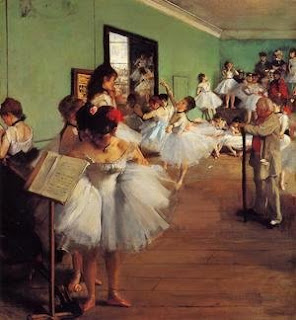Jasmine Mendoza Painting I M. Zimmer 11/6/17
Edgar Degas 💃💃(19 July 1834 –
27 September 1917)
 |
Self-Portrait in a Soft Hat,
Oil on Canvas, 1857
|
 |
The Rehearsal, Oil on Canvas, 1873, 47.2 x 61.5 cm
|
Born Hilaire-Germain-Edgar
Degas in Paris, France and the
eldest of five he is famous for his work in
painting, sculpture, printmaking, and drawing. Degas is now considered
"one of the founders of impressionism"
Impressionist use bright, "dazzling" colors, concentrating primarily on the effects of light, and hoping to infuse their scenes with immediacy. Degas rejected this title, but others agree these paintings display his mastery in the depiction of movement.
 |
Dancers in blue, Oil on Canvas,
1890
|
"It is Degas'
fascination with the depiction of movement, including the movement of a
spectator's eyes as during a random glance, that is properly speaking
'Impressionist'." -Art historian, Charles Stuckey.
In his youth his desire was
to be a history painter, a calling for which he was well prepared by his
rigorous academic training and close study of classic art.
By eighteen he had turned a
room in his home into an artist's studio, and had begun making copies in the
Louvre. He remained an enthusiastic copyist into middle age.
Then in his early thirties he
changed course, he became a classical painter of modern life.
 |
Dancers in pink, Oil on Canvas,
1880
|
Late 1880s, Degas
also developed a passion for photography. He photographed many of his friends,
often by lamplight. Photographs, depicting dancers and nudes, were used for
reference in some of Degas' drawings and paintings.
He began to paint women at
work, milliners, laundresses, and dancers at work. Rising from the Ballet La Source was
his first major work which he later identified with, in the subject of dance. Over
half his works depict dancers.
Toward the end of his life he's
known to have been working in pastel as late as the end of 1907, and believed
to have continued making sculpture as late as 1910, then apparently ceased
working completely in 1912 when his longtime residence was demolished.
 |
Ballet Practice. Oil on Canvas,
1873
|
 |
Dancers, Oil on Canvas, 1878
|
He never married and spent the last years of his life, nearly blind, restlessly wandering the streets of Paris before dying in 1917 (83 yrs). Degas' last years were sad and lonely, especially as he outlived many of his closest friends.
Degas's work was
controversial, but was generally admired for its draftsmanship.
 |
Dance Class, Oil on Canvas, 83.5
x 77.2 cm
|
I was first exposed to his work when I was very little and in fact taking ballet classes. My Dance teacher was a fan of his ballerina paintings because she knows about those backstage views, musicians playing live, and practicing all day. I knew I had to do some research on him once I knew Edgar Degas was the one who made these lovely paintings.
The different types of strokes used to capture texture is really incredible. The tulle of the skirts is so believable!
ReplyDeleteYes he has a great eye in capturing that texture. I really enjoy looking at the different strokes and shadows from the performing dancers.
DeleteHis use of light and color is truly astounding. I also really enjoy the texture he uses the emphasize movement
ReplyDeleteYeah, light and color in the dresses or opposite making the white dresses stand out of the colorful background makes the paintings look like a snapshot in the moment.
DeleteThe dresses are so beautiful along with his use of color. They're simply stunning and so enjoyable to look at.
ReplyDeleteI agree. I would always take a few minutes to look at them when I passed back then.
DeleteI have always been such a fan of Degas! I have never been very good at recognizing artists just based on style or topic, but the strokes in his work are always so recognizable. His pieces really are amazing.
ReplyDeleteHis paintings do have so much movement within them, I was just curious as to in your research if you found any information on the type of tools he uses while painting (i.e. palette knife?)
ReplyDeleteI was not able to find his tools for painting. I did mostly look on his organization page but I'm sure that is out there somewhere. I would also like to know how he was able to know how he capture those moments in time like a screenshot like they said.
DeleteThis is probably one of the most famous artist that I know of before I got into the art program. I love his romantic colors and topics. For me this is not a common theme that I navigate towards
ReplyDeletehowever I love his floral stills. I like how his painting have motion and seem lifelike despite being impressionistic in style.